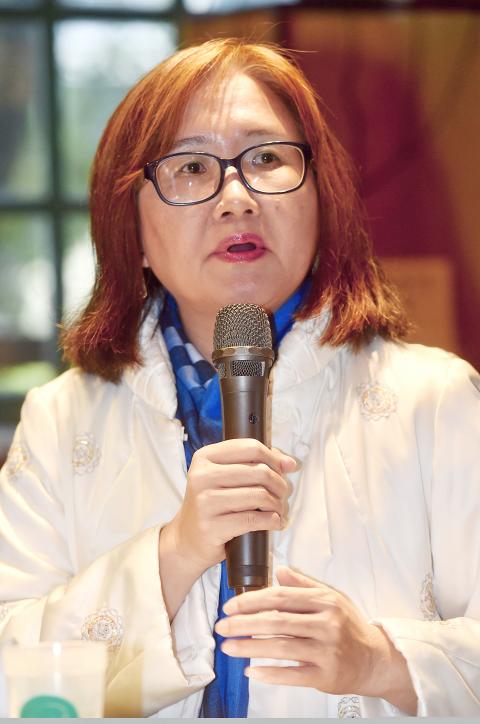The Transitional Justice Commission has listed four flaws in new curriculum guidelines for the 12-year national education system, which are scheduled to be implemented in September next year.
The flaws are: a lack of content on the 228 Incident and ensuing White Terror era in high-school curricula, an absence of content about the Holocaust, romanticizing the party-state system and claiming that the quest for transitional justice is potentially divisive.
To promote transitional justice, it is the commission’s job to review curriculum guidelines, as well as textbooks and test questions, particularly to see if they purposefully neglect to mention transitional justice or the White Terror era, commission member Hua Yih-fen (花亦芬) said yesterday.

Photo: Chien Jung-fong, Taipei Times
The chapter in the guidelines about the Republic of China government’s arrival in Taiwan and subsequent transformation gives accounts of the incidents in a fashion that runs counter to the spirit of transitional justice and is unhelpful in demystifying how the Chinese National Party (KMT) used the “political tutelage” period as a pretext for establishing party-state rule, Hua said.
The curriculum guidelines fail to discuss the party-state system from a legal point of view, which is not only detrimental to ridding society of the remnants of authoritarian propaganda, but also romanticizes the party-state era, she said.
The KMT had not promulgated the Constitution when it ushered in the Period of National Mobilization against Communist Rebellion in July 1947, and in 1948 it promulgated the Temporary Provisions Effective During the Period of National Mobilization for Suppression of the Communist Rebellion (動員戡亂時期臨時條款), which it used to nullify the Constitution, Hua said.
The chapter should be renamed “Building the Party-state Rule Under Political Tutelage,” to ensure a smoother transition to the chapter on the 228 Incident and the ensuing White Terror era, she said.
Hua said some junior-high school history teachers have complained about textbooks praising the political tutelage period.
While the junior-high school history curriculum includes the White Terror era as a topic, only one hour of class time is allocated to it, which is not enough to provide students with a good understanding of the era, Hua said.
Even more glaring was that the 228 Incident and the White Terror era are reduced to a footnote in a chapter titled “The Pursuit of Autonomy and Democracy: Democracy and Human Rights Movements After World War II,” she said, adding that this approach is no different from curtailing transitional justice, as if the people responsible for designing the guidelines were afraid of making high-school students aware of the topic.
The guidelines in their current form only teach 12th graders about transitional justice in a chapter titled “Modern Warfare and State-induced Violence,” Hua said, adding that it does not mention organizations that should be held responsible for past injustices and claims that the process of pursuing transitional justice could spark ethnic and political conflicts.
The new guidelines should also include chapters on the Holocaust as stipulated in the UNESCO’s guidelines, she said, adding that this would bring Taiwan more in line with other countries.

Japanese footwear brand Onitsuka Tiger today issued a public apology and said it has suspended an employee amid allegations that the staff member discriminated against a Vietnamese customer at its Taipei 101 store. Posting on the social media platform Threads yesterday, a user said that an employee at the store said that “those shoes are very expensive” when her friend, who is a migrant worker from Vietnam, asked for assistance. The employee then ignored her until she asked again, to which she replied: "We don't have a size 37." The post had amassed nearly 26,000 likes and 916 comments as of this

US President Donald Trump said "it’s up to" Chinese President Xi Jinping (習近平) what China does on Taiwan, but that he would be "very unhappy" with a change in the "status quo," the New York Times said in an interview published yesterday. Xi "considers it to be a part of China, and that’s up to him what he’s going to be doing," Trump told the newspaper on Wednesday. "But I’ve expressed to him that I would be very unhappy if he did that, and I don’t think he’ll do that," he added. "I hope he doesn’t do that." Trump made the comments in

Tourism in Kenting fell to a historic low for the second consecutive year last year, impacting hotels and other local businesses that rely on a steady stream of domestic tourists, the latest data showed. A total of 2.139 million tourists visited Kenting last year, down slightly from 2.14 million in 2024, the data showed. The number of tourists who visited the national park on the Hengchun Peninsula peaked in 2015 at 8.37 million people. That number has been below 2.2 million for two years, although there was a spike in October last year due to multiple long weekends. The occupancy rate for hotels

A cold surge advisory was today issued for 18 cities and counties across Taiwan, with temperatures of below 10°C forecast during the day and into tonight, the Central Weather Administration (CWA) said. New Taipei City, Taipei, Taoyuan and Hsinchu, Miaoli and Yilan counties are expected to experience sustained temperatures of 10°C or lower, the CWA said. Temperatures are likely to temporarily drop below 10°C in most other areas, except Taitung, Pingtung, Penghu and Lienchiang (Matsu) counties, CWA data showed. The cold weather is being caused by a strong continental cold air mass, combined with radiative cooling, a process in which heat escapes from